Year 61 – ATHENS – March-April – 1985 – Page No. 438
WE SEEK A FREE AND VIBRANT CHURCH
Editor-Publisher
Augustine N. Kantiotis
CHRISTIAN SPARK
- “If someone comes toward you and bears not this teaching, accept him not into your home, and greet him not.” (2 John verse 10)
- “For heretics things sacred are untreadable” (From the interpretation on the 6th canon in the Laodikeia canon)“The advocate of the religion is that very body of the Church, that is that (faithful) people’ (Response – Encyclical of patriarchates of 1848)
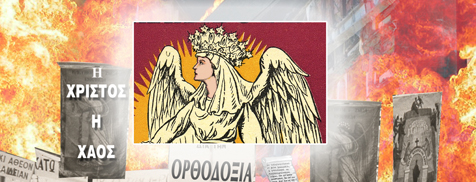
OPEN EPISTLE TO THE ECUMENICAL PATRIARCH
MR. DEMETRIOS [*]
- [*] This was published in issue no. 438 of March-April 1985 page of the periodical “Christian Spark”. From the year 1972, after the death of Athenagoras, upon the ecumenical throne of the patriarchate of Constantinople is found, as we said, another patriarch. Despite the change, however, of the person at the peak of Orthodoxy and despite the confessedly peace-loving and humble successor of Athenagoras, his all-holiness mr. Demetrius, the line followed has in no way changed. Indeed the ecumenical activities and violations of the sacred canons have intensified to the point, that all who pain on account of Orthodoxy are becoming very anxious and are orienting themselves towards avoidable activities, as was that of the three in action bishops going under the jurisdiction of the new lands (of the ever-memorable metropolitan Eleftheroupolis mr. Ambrose, of the metropolitan of Paramythias mr. Paul and of the present writer), cutting off the commemoration of the name of the patriarch Athenagoras from the year 1970 and afterwards. This present letter constitutes an expression of this agony, which 23 years after the preceding letter to Athenagoras (1962), will come to also ring the bell of danger to mr. Demetrios.
Your all-holiness,
By the grace of God, by the mercies, and pities of the all-good God, the present writer happens to be a bishop of the Orthodox Church of Christ. For eighteen consecutive years I serve in this end region of Florina and try to properly respond, as much as I am capable of doing, to my most weighty episcopal duties in these hard times, during which huge waves of materialism and atheism rise up and strike against the sacred ship of the autocephalos church of Greece.
Concern for the whole Church
Now these duties would be capable of sucking my entire interest as shepherd having the responsibility for the perdition even of one only soul, on account of which the blood of the God-man was shed. But as member of the Hierarchy of the Orthodox Church I am not capable of remaining indifferent, also, regarding everything and anything that occurs in the entire region of the Orthodox Church, which spreads her branches even unto the five continents. For according to the teaching of the chief of the apostles, Paul, those belonging to the Church constitute a singular body, the body of Christ, and “when one member suffers” (1 Cor. 12:26), the rest of the members must co-suffer, and indeed particularly those members, which have a protruding, prominent position, as the head. And, as the ecumenical teacher of the Church, John the Golden-mouthed, (Chrysostomos), says that, if a thorn plunges into the sole of a foot, the whole body slouches, and the head leaves its upright position, it is humbled and bent over towards the suffering member and makes every effort for the removal of the thorn. In like manner, observes the sacred father, it must occur in the Church of Christ. If, that is, one member of the Church runs the risk of undergoing some serious danger, all the members – for yet a greater reason the bishops – are in duty bound to display vitally their interest towards the therapy of the evil, so that this does not evolve into gangrene, threatening the whole body. But even the prayers, which every regional church sends forth in behalf of all the rest of the member-parts, the orthodox churches, as well as the remembrances, which are done in the services, constitute a proof, that all the Christians, and indeed bishops, must not limit their interest to the borders of their small areas, but to extend that interest unto the ends of the earth, in which orthodox people dwell. Indeed the same sacred father, John Chrysostom, in weaving an encomium to saint Efstathion, bishop of Antioch, says concerning him that his interest used to extend beyond the bounds of his bishopric.
For “he had received good paideia (education; culture; learning; right nurturing) by the grace of the Spirit, for being in charge of the Church not only there [in his own bishopric,] was he in duty bound to rule, which he was ordained by the Spirit to do, but also [to rule] every (church) subsisting in the inhabited world; and he learned these things from the sacred prayers. For if he must make prayers, he says, in behalf of the catholic Church, which is from one end of the inhabited world to the other, how much more does he also have to show providence in behalf of all of her (the Church), and in like fashion to lead and care for all” (See Greek Fathers Mign 50, 602).
It is, then, a sacred duty, of the most sacred duties, for every bishop of the Orthodox Church to actively observe with interest, attention and anxiety everything and whatever happens in the orthodox sphere, and to contribute to its spiritual progress. Woe if the bishop becomes enclosed within the narrow bounds of his bishopric and remains completely indifferent towards the general state of the Church, contenting himself with the idea that the voracious fire of errors, of heresies and of atheism, which happen to set aflame all the bishoprics, will not reach in a short time his region, too.
The one studying the sacred canons of the Church with amazement observes that, though these (canons) prohibit the intervention of a bishop in the administrative duties of other bishoprics, yet, nevertheless, there does exist the case, according to which, altogether exceptionally, not only is it allowed, but it is demanded, that bishops, besides the prayers, petitions and admonitions, display their more vital interest in behalf of other bishoprics. And this very case is when a bishop of one eparchy, though he sees the wave of heresy threatening his eparchy, does not only take no measure whatsoever, but remains completely neglectful and indifferent; or, what is still worse, he co-agrees, [consents, and collaborates] with these heretics and utters words insulting the orthodox faith (See canons 121 of the Synod of Carthage and the 15th of the First-second [Synod]). The struggle in behalf of orthodoxy, as we see, demands still more, manifestations of extraordinary activity, which, though they are found to be outside the usual scheme, not only are not condemned, but are praised. And even as ecclesiastical history testifies, because of such manifestations and operations in behalf of the patristic piety, whole regions were saved, which were in danger from the expansion of heresies.
The Church in the Face of Heresies and Schisms
If, your all-holiness, the above [considerations] are taken seriously into view, then my present epistle will not be considered a [kind of] superseding of duty or as an intervention into the duties of others, but as an expression of the unrest of an elder High-priest, who, on account of his position, has spiritual dependence, too, from the Ecumenical Patriarchate. He for already half a century by means of the grace of God is working in the vineyard of the Lord, and on account of his oral and written preaching, comes often into communication with the more broad strata of the people.
With all due respect, then, which we have for the Ecumenical Patriarchate, let it be permitted us to say, that the contemporary state in general in the orthodox sphere, and particularly in the region of the jurisdiction of the Ecumenical Patriarchate, judged by orthodox criteria, as are the sacred canons, is not at all pleasant, but engenders great dangers. And behold why.
According to our faith, which for centuries we declare in the Creed of the Faith, the Church is ONE (“I believe…in one holy, catholic, and apostolic Church”, 9th article of the Symbol of faith). And this very same ONEChurch is our holy Orthodoxy, which preserves as a priceless treasure the sacred deposit, which the Lord gave to her through his holy apostles and through the ecumenical and regional synods. Concerning this deposit, the apostle Paul writing to his disciple and bishop of Ephesus Timothy, says:
“O Timothy, [keep vigilant] guard over the deposit, derailing the sacriligious vain-voices and contrieties of pseudo-knowledge, by which certain ones in declaring them concerning the faith, have missed the mark.”
Now in the response of the great Church of Constantinople to the encyclical of the pope of Rome Leontios 13th, during the year 1885, we read the following characteristic remarks.
“Christ-loving peoples of the glorious lands of the West! … The redeeming faith in Christ for all time ought to be correct in every respect and according to the holy Scripture and the apostolic traditions, upon which is based the teaching of the divine Fathers and the seven holy and god-selected Ecumenical Synods. It is obvious to the aforementioned that the entire Church of God, which contained within her bosoms the singular and unadulterated and wholesome salvific faith as a divine deposit, … this same Church is one and singular unto eternity, and not some multiple and variegated with time product; insomuch that evangelical truths do not accept variation or progress in time, as do the various philosophical systems, because “Jesus Christ is the same yesterday and today and for ever more” (Hebrews 13:8)” (See “The Dogmatic and Symbolic Monuments of the Orthodox Catholic Church” by John N. Karmiris, vol. 2 Athens 1953, p. 944).
And as an ever-memorable High-priest, a fervent lover of Orthodoxy, used to say,
“this same deposit contains everything and whatever our Orthodoxy has that is sacred: dogmatic exactitude, god-taught ecclesiastical commonwealth, sacred and holy traditions, a long and glorious history.”
The Church is ONE, the Orthodox Church. Besides her all the other religious forms are heresies or schisms. And they are improperly called churches. Now what should the relation of the Orthodox Church be towards the other confessions-heresies – this constituted the initial issue of discussion in regional and ecumenical synods. These same [synods,] in interpreting the teaching of the New Testament, and particularly a certain few of its characteristic passages, (as, for example, Math. 7:15; 16:6; Titus 3:10; 2 John verse 10,), articulated in the form of sacred canons and ordained, on penalty of defrockment (unrobing) or excommunication, the mind-set and stance of orthodox before heretics. Behold the text of the above passages:
- a) “Beware of the pseudo-prophets, who come to you in sheep’s clothing, but within are ravenous wolves” (Math. 7:15).
- b) “And Jesus said to them: Look (out for yourselves) and be careful, (keep guard) from the leaven of the Pharisees and Sadducees” (Math. 16:6).
- c) “Quit (communicating with) a heretical man after the first and second admonition” (Titus 3:10).
- d) “If somebody comes to you and bears not this teaching, do not accept him into your home, and do not greet him” (2 John verse 10).
Shall we, here, also call to remembrance the sacred canons? They are known to every bishop. We call to remembrance, however, certain ones of them, the following. 45th, 65th of the holy Apostles, of the 1st and 3rd Ecumenical Synod, and the 6th, 9th, 33rd, and 37th of the Synod of Laodikeia (See “Pedalion” published by “Asteros”, Athens 1957, pp. 50-51, 84-85, 170-171, 422, 433, 435). By the sacred canons, then, as many annotated and interpreted them, distinguished canon law specialists and interpreters, among which, also, is saint Nicodemos the Hagiorite, it is prohibited literally for heretics to enter into the sacred churches of the orthodox (“what is sacred is not to be treaded upon by heretics”); prohibited are: common concelebrations, joint prayer, addresses and counter addresses in the sacred churches: prohibited is the exchange of gifts between orthodox and heretics; prohibited is the entrance of orthodox into synagogues (congregations) of Jews or heretics, as also into conventions of apostasy [*].
[*] Of these sacred canons called to remembrance we cite herein the text of one only (the 6th Canon of the Laodiceia Synod), as well as the interpretation, which was composed by saint Nicodemos the Hagiorite, as also the related, relevant commentary from the sacred-canonical book “Constitution of Divine and Sacred Canons” of the authors G. Ralli-M.Potli (vol. III. Athens 1853, p. 176).
CANON 6 (Text): “Concerning the non allowance of heretics to enter into the house of God, who persist in heresy.” Interpretation (Nicodemos the Hagiorite); The ordinance of the present Canon is for heretics not to have license, permission to go inside the sacred temple of God, which is held by Orthodox, that is, if they persist in the heresy and do not want to return” (See “Pedalion”, publication of “Asteros”, Athens 1957, p. 422). Commentary (from the above mentioned book of Ralli-Potli); “Those who have fallen into heresies, and remaining in them, are ostracized from the Church, as being aliens” (Zonaras). “Heretics are not to step on what is sacred. It is not allowed for heretics to enter into the house of God…” (Aristenos).
Are the Sacred Canons [Kept and Actively] Observed?
And we ask: These sacred canons, which were put together in holy Spirit by god-bearing fathers, whose shoe laces we modern fathers are unworthy of untying, are in force or not in force in the Orthodox Church? Yes or no? If not, then honorably and with straight talk it must be said and it must be indicated, which organ superior to ecumenical and regional synods took such a more modern decision. For it will constitute an example of the ultimate hypocrisy, for the bishops, on the one hand, during the dreadful hour of their ordination to promise that they shall [vigilantly keep or actively] observe them without deviating, but in practice though, to trample them underfoot flagrantly and to provoke in this way the astonishment of the remaining faithful, who in this century of faithlessness preserve the kindlings of Orthodoxy, as the canon (rule) of faith and life. If however, the sacred canons continue to be in force, then these canons should be enforced in practice and every person that dares to stray away from their line should undergo the demanded annulments. To this question there must, at all events, be given an answer. For, it is not concerning an issue which, according to the teaching of the canons, there is room for economy and condescension. This is about the issue related to the faith, concerning the protection of that which is of the orthodox faith from apostates and heretics, who, so long as they do not repent, but persist in their errors, must be found at the canonical, [proper] distance. Now the keeping of such a distance must not be characterized as “misallodoxia” (hatred for people of other views) and harshness, but as an expression of a robust orthodox “phronema” (mentality; mind-set; mental orientation) and genuine Christian love, which through strictness looks to the enlightenment and coming to an awareness of the those in error and their return to the sacred fold. For this kind of strictness, which encloses depth of love, sacred Augustine clamours: “O merciful strictness!”.
Unfortunately, it must be confessed that the hurried and untortured (lax and unexamined) lifting of the anathemas between Rome and Constantinople that took place at the time of your predecessor patriarch Athenagoras, against which very visible hierarchs of the ecumenical Patriarchate protested, without however being heard, opened, as was consequent, the doors also to papism, and to the other heresies and schismatic bodies. The capstones (ceilings; roofs) of the Orthodox Church were abolished. The sacred canons, which ordain, define and regulate the relations of orthodox towards heretics, were trampled upon and are being trampled upon without reserve [shamelessly], and the scandalization coming from this is big. And so that we are not considered to be speaking undefinably [abstractly] and generally, from the many such violations we mention here certain ones, that is, the most known ones.
Samples of Violations
- 1) The yearly concelebrations by orthodox and papists of the enthronement feast-day of the apostle Andrew (November 30) in the patriarchal church of the Phanar. Also the concelebration of the corresponding enthronement feast-day of the apostle Peter (29 June) in Rome by the papists and orthodox, and during these concelebrations the relative addresses and counter-addresses, and the exchange of gifts.
- 2) The addresses that are delivered, counter-addresses, and joint prayers in orthodox churches during the visits of the pope in Sydney, Australia (in December of 1970), in Constantinople (the year 1979), in the patriarchal temple of Sambesy in Geneva, Switzerland (in June of the year 1984), and in Canada (in September of the year 1984).
- 3) The joint prayers and observances of common liturgies by orthodox and papists during the conventions of members of the so-called Theological Dialogue in Patmos-Rhodes (the year 1980), in Monacho of Germany (in July of 1982) and in Chania-Crete (end of May – beginning of June of the year 1984).
- 4) The observed joint prayers at the conventions of the “World Council of Churches” (W.C.C.), as also at its last general convention performed in VancouverCanada in the fall of the year 1983.
- 5) The exchanging of gifts from time to time between papists and orthodox high-priests in Rome and elsewhere, on the occasion of various occurances (visits to the Vatican, the returning of sacred relics on its [Vatican’s] part to sacred metropolises of the Church of Greece, and so on).
- 6) The public and spectacular reception of cardinal Vilemrants by the orthodox church of Crete, who followed the orthodox divine liturgy in the sacred church of Saint Mena in Heraclion, dressed in priestly adornment and finally blessed the orthodox people from the beautiful gate of the above [mentioned] sacred temple.
- 7) The ecumenical co-prayer or joint prayer of orthodox and papists in the orthodox church of Brussels of Belgium, in which, on the part of the orthodox participated the previous metropolitan of Belgium mr. Aemilianos.
- 8) The performance of a trisagion by orthodox high-priests of the ecumenical throne before the corpse of pope Paul the 6th who had passed away in the year 1978.
- 9) The event during the enthronement of the metropolitan of Sweden (of the ecumenical throne) mr. Damascene, of a joint prayer session of orthodox, papists, and protestants in the sacred temple of Saint Paul of Geneva.
- 10) The referral made during the year 1983 for the transmission of the divine eucharist to the papists by orthodox clerics of the sacred archdiocese of Thyateron and Great Britain, as also the participation more previously (in the year 1979) or orthodox clerics of greater London in an ecumenistical vesper service within the papal temple of Westminster.
- 11) During the past year (May-June 1984) the reception and entrance into orthodox churches of cardinal of Vienna, Kainich, as also his entrance and his co-prayer or joint prayer held with orthodox in a sacred monastery of Mount Athos.
- 12) The participation of the metropolitan of Germany, mr. Augustine (Lambardaki) in an ecumenistical worshipful function (blessing of the sweet bread) in July of the passed year 1984, as the newspapers of Stuttgard wrote up.
Towards the Wolves Politeness, Towards the Sheep Austerity?
The above cases, few of the many, constitute flagrant violations and trampling upon the sacred canons, which, if they occurred in other times, when the orthodox faith was robust, they would not be dared, and whichever chance violators would be punished in an exemplary manner. But today they take place publicly and indeed provocatively, and the most scandalous thing of all is this: wherever, that is, orthodox appear, faithful children of the Church, protesting against the violations, these are placed into persecution by their head parish priests of the regional orthodox churches, are excommunicated and punished, and by Hagiorite (Mount Athos) fathers that go about abroad in the diaspora, are placed under austere, strict penances (as the deprivation of the divine communion, and so on.) There are not lacking also even threats against the protesters, as additionally their beatings by those holding opposite views, which remind one of the frightful periods of the Church, during which the heretics were supported and taken care of [in every way], and the faithful were persecuted cruelly or mercilessly, as occurred during the period of arianism. What a frightful thing! Where have we ended up! Heretics of every sort, masons and [so-called] Jehova’s Witnesses, atheists and unbelievers, are not being excommunicated, but faithful children of the Church are being excommunicated, children which, as we said, preserve still the kindlings of the orthodox faith and the patristic piety/godliness. The most rev. of Australia, mr. Stylianos, the most rev. of Switzerland mr. Damascene, the god-beloved bishop of Toronto (Canada) mr. Soterios, and whoever else, forget that, according to the encyclical of the patriarchates of 1848, the faithful “laos,” people is the guardian of Orthodoxy and for no reason whatsoever is it permitted for him to be spurned, reviled or abused. Behold an excerpt from this most important response-encyclical:
“Among us neither Patriarchs nor Synods were capable ever of introducing new [things/lawless innovations], because the advocate or supporter of the Religion is that very body of the Church, that is the people itself, who wants its religion eternally unchanged and of the same form as that of its fathers” (See the cited work “The dogmatic and symbolic monuments of the Orthodox Catholic Church” by John N. Karmires, vol. 2, Athens 1953, p. 920.)
Now, as Basil the Great observes in his famous homily on the Six-day Creation, just as the sheep that grazes in the meadow discerns the poisonous plant and does not touch it quantitatively, thus also the rational sheep of the flock of Christ, however humble the position that they might posses, are taught godwards (from God, theothen) and discern the kind of spiritual food that is offered to them. The remaining faithful people, this remnant of Orthodoxy, today unfortunately is mocked, disdained and excommunicated, while the masons, the papists and the rest of the heretics chance to enjoy affectionate embraces and various forms of [delicate] attending towards the full, as it appears, application of the prohibitive ordinances of the canons of the Orthodox Church which are against this.
Under such circumstances the dividing line between orthodox and heretics is continually weakening and is tending towards disappearance or extinction, and the pan-heresy of ecumenism, according to the ever-memorable Justin Popovitch, is tending to flood Orthodoxy. In the souls of godly/pious priests and bishops of the Orthodox Church there are observed already crises of conscious, about whether, after such deviations – why not also betrayals? – they should continue to commemorate the names of bishops, archbishops and patriarchs, as correctly dividing the word of TRUTH. A few of them, to be sure, overstress love, saying that, because of love, it is demanded that many retreats and sacrifices be made. But genuine, authentic love is closely conjoined to the truth. It is not enough simply to say that we love, but also to “be true in love” (Ephesians 4:15); that is, to have real love and sincere love, accompanied by the true faith, and for us to look for the spiritual and psychical interest of the beloved [one]. For love without truth, without the faith, is falsehood and deception. Love as a heavenly plant, as a plant rejoicing in truth, takes pleasure, blossoms, and bears fruit only within the truth. And the whole truth, not only a part of it, is found in Orthodoxy.
The orthodox people, found before such kinds of unacceptable manifestations begins already to be in serious unrest. And the black flag, which was raised in some sacred monastery of Mount Athos, as a robust protest on account of the anti-orthodox deviations and manifestations, has touched and moved many.
We do not Threaten, But We Pain and Are in a State of Unrest
Your all-holiness, in finishing already my present epistle, with tears I ask you, as well, also, as the Sacred Synod about you, that you give the necessary attention to whatever an elder presbyter bishop of the Orthodox Church of Greece directs to you, melting his life away in the service of the vineyard of the Lord, and receiving for a long time now a very great many letters of faithful Christians asking for guidance and support. Therefore I also straightway ask you, that you re-evaluate your in the main prohibited stance before the heretics and especially before papism, which, as it speaks and acts, continues to win ground at the expense of Orthodoxy, of which 9/10ths remain unfortunately for a long time under the influence of atheists and totalitarian regimes. It is not the time for unifying endeavors with the heretics. Shut out then whatever entrance to the papists and the rest of the heretics from the orthodox sacred churches, since no proof exists that these people recognize their cacodoxies (false views) nor display sincere repentance. Moreover, prohibit the entrance of orthodox clerics to worship areas of heretics, as well as to Jewish synagogues. The orthodox people throughout the earth, the front-line of battling Christianity – let it come together and close ranks; let it examine and let it solve the problems occupying it; and, to begin with, let it exert itself in its sacred endeavor for the unity of the orthodox world. And if this happens, then the time will come for the outreaches outside the garden of Orthodoxy. Otherwise, if the same situation continues and the violators of the sacred canons, on the one hand, in relation to the heretics remain unpunished, and, on the other, the children of Orthodoxy are threatened with penances and excommunications, how is it possible for the present writer, who for reasons of conscience together with other high-priests had stopped previously the commemoration of your predecessor, how is it possible – I say – now, when the openings towards those outside became broader and already very dangerous, for me to continue to remember your name as rightly dividing the word of truth?
In ringing, then, the bell of danger from this very end of the Hellenic fatherland, I express the agony not only of my flock, but also of thousands of other Christians of Hellas and abroad. Hear these voices as a voice of many waters and do not bring us to the difficult position to cease anew the remembrance of the ecumenical patriarch. Let this not be considered a threat, but as a cry of pain and agony and as the very last petition towards your all-holiness for the immediate return of the great church of Constantinople to that orbit, which in holy Spirit was circumscribed in the ecumenical and regional synods and from which ever-memorable fathers and teachers of the Church, prototypes of true shepherds, did not stray away from the least bit, but sacrificed even their very life in behalf of Orthodoxy.
I undersign reverently
The least brother in Christ
+ Metropolitan of Florina, Prepon, and Eordaias
AUGUSTINE (Kantiotis)
Open Letter to Patriarch:Politeness to Heretics and Harshness to Pious O…
 Posted by: Επίσκοπος Αυγουστίνος Καντιώτης on
Posted by: Επίσκοπος Αυγουστίνος Καντιώτης on  Δεκ 10th, 2010 |
Δεκ 10th, 2010 |  Filed under: Albanian, Cрпски језик, English, ΣΥΜΒΟΥΛΕΣ
Filed under: Albanian, Cрпски језик, English, ΣΥΜΒΟΥΛΕΣ
![]()
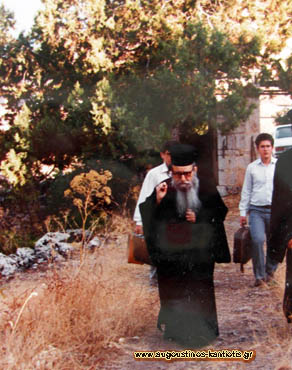 «Yπάρχουν άνθρωποι, που όταν είναι καλά και το πορτοφόλι τους είναι γεμάτο και τα παιδιά τους προοδεύουν και όλα είναι ευχάριστα, δοξάζουν τον Θεό. Όταν όμως έλθει καμία θλίψη, τότε χάνουν την ψυχραιμία τους, γογγύζουν και βλαστημούν και καταριώνται την ημέρα που γεννήθηκαν, υπάρχουν δε και άλλοι που τόσο πολύ απογοητεύονται, ώστε δίνουν τέρμα στη ζωή τους με αυτοκτονία.
«Yπάρχουν άνθρωποι, που όταν είναι καλά και το πορτοφόλι τους είναι γεμάτο και τα παιδιά τους προοδεύουν και όλα είναι ευχάριστα, δοξάζουν τον Θεό. Όταν όμως έλθει καμία θλίψη, τότε χάνουν την ψυχραιμία τους, γογγύζουν και βλαστημούν και καταριώνται την ημέρα που γεννήθηκαν, υπάρχουν δε και άλλοι που τόσο πολύ απογοητεύονται, ώστε δίνουν τέρμα στη ζωή τους με αυτοκτονία.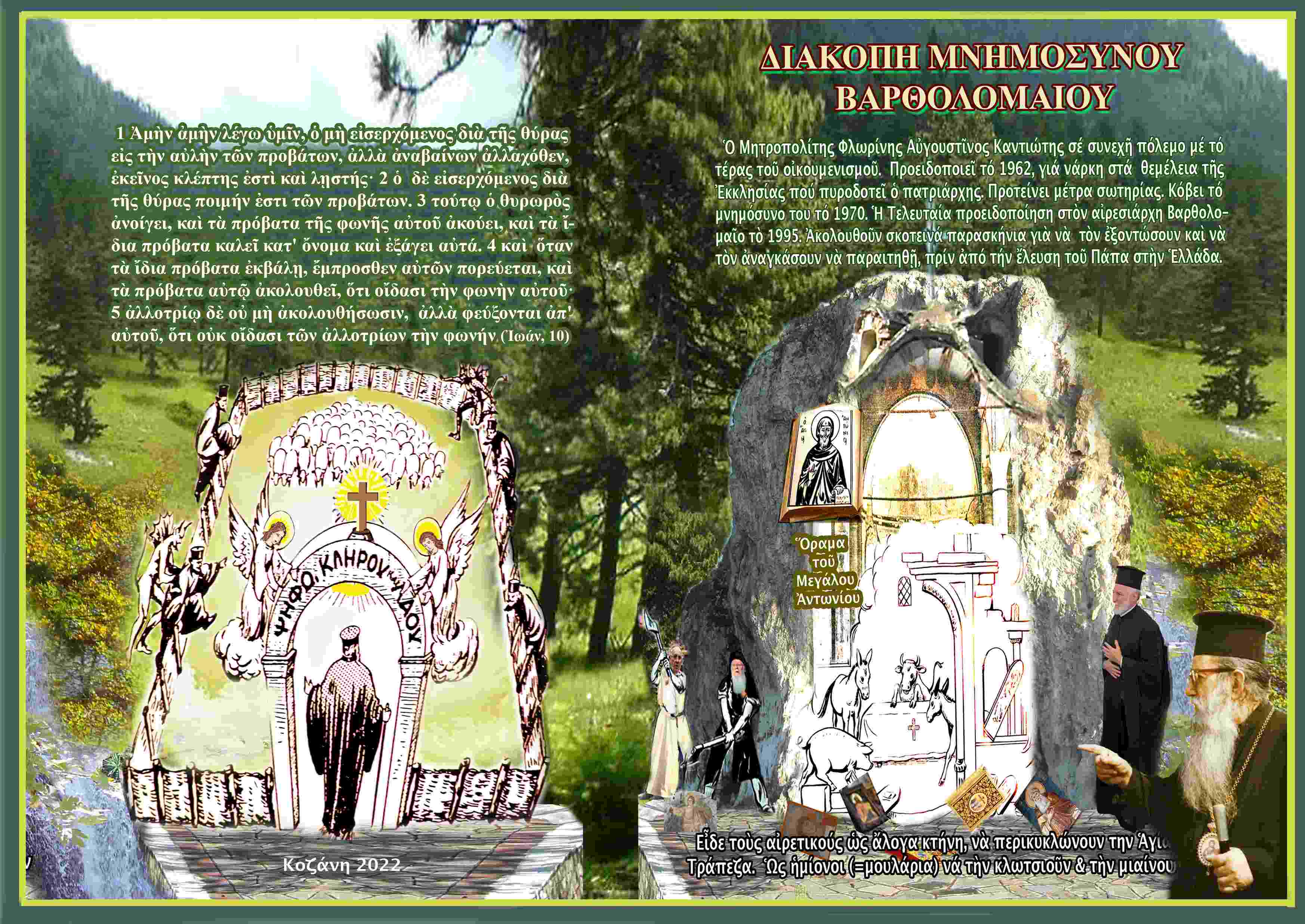

 Be the first!
Be the first! 
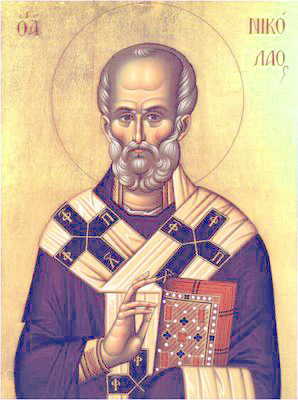

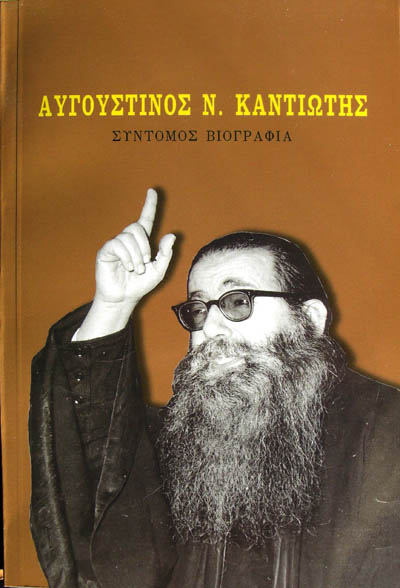 By Archimandrite Laurentios Gratseas
By Archimandrite Laurentios Gratseas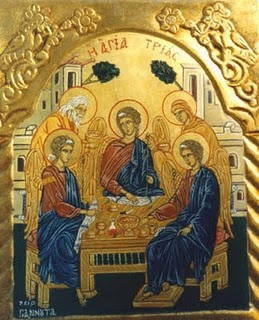 “And I believe in the Holy Spirit, the Lord, the Giver of Life, who proceeds from the Father, who, together with the Father and the Son is worshipped and glorified, who spoke with the prophets.”
“And I believe in the Holy Spirit, the Lord, the Giver of Life, who proceeds from the Father, who, together with the Father and the Son is worshipped and glorified, who spoke with the prophets.”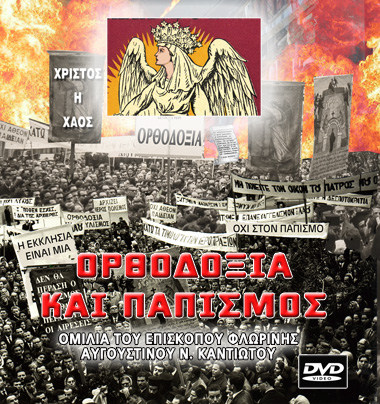 Without reservation we say that papism is a toppling of the fundamental laws of the Church, of genuine Christianity. And behold why.
Without reservation we say that papism is a toppling of the fundamental laws of the Church, of genuine Christianity. And behold why.
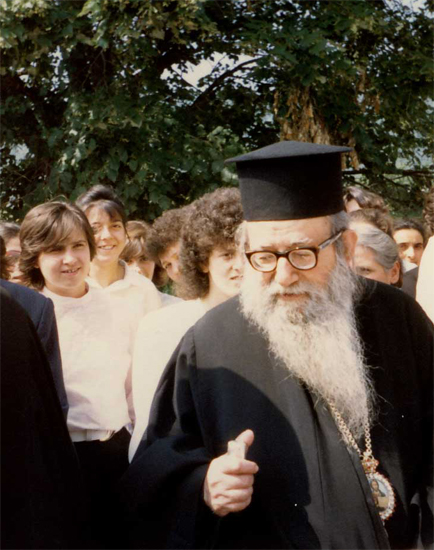 I have many things to tell you, but here now I will only stress one thing: that you are no longer small children; you’re not little sucklings nor infants nor children of grade school. You are already at the most beautiful but also the most difficult age, the age of puberty. You are 13, 14, 15, and 16 years old. Not big but neither small. And I prove it. One night, with drenching rain, I went to Astrapo, a village that is built on the slopes of the VitsiMountain which is 900 meters high. The inhabitants of the village gathered together and I spoke to them. The women were dressed with the beautiful Macedonian dress, which is the most beautiful and most modest style. So I saw there girls your age being affectionate mothers and holding babies in their bosoms. You’ll tell me, Is it right for them to marry so young? That’s another issue; I don’t examine it here. It has its pros and cons. That which I want to emphasize here is that other girls your age are mothers. Consequently you too, even though you’re not parents, all have, more or less, an idea about sex in our epoch of pansexualism in which we live.
I have many things to tell you, but here now I will only stress one thing: that you are no longer small children; you’re not little sucklings nor infants nor children of grade school. You are already at the most beautiful but also the most difficult age, the age of puberty. You are 13, 14, 15, and 16 years old. Not big but neither small. And I prove it. One night, with drenching rain, I went to Astrapo, a village that is built on the slopes of the VitsiMountain which is 900 meters high. The inhabitants of the village gathered together and I spoke to them. The women were dressed with the beautiful Macedonian dress, which is the most beautiful and most modest style. So I saw there girls your age being affectionate mothers and holding babies in their bosoms. You’ll tell me, Is it right for them to marry so young? That’s another issue; I don’t examine it here. It has its pros and cons. That which I want to emphasize here is that other girls your age are mothers. Consequently you too, even though you’re not parents, all have, more or less, an idea about sex in our epoch of pansexualism in which we live.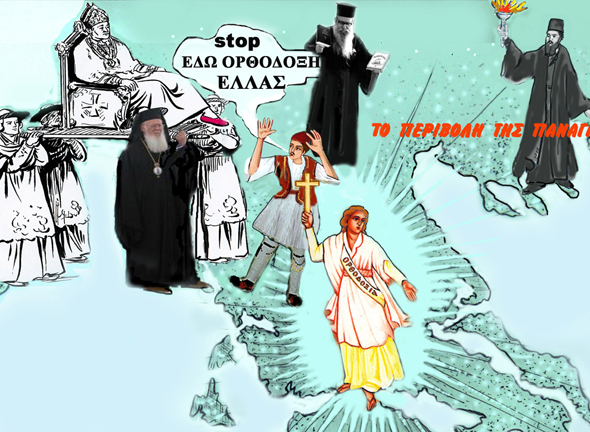 Last month (January 19, [2005]) we celebrated saint Mark bishop of Ephesus, Eugenicos, who said a “no” to the pope. Today is heard again a “no” to the pope. Some other saint said it, a great teacher and father of the Church, sacred Photios. Concerning him, we shall say a few words.
Last month (January 19, [2005]) we celebrated saint Mark bishop of Ephesus, Eugenicos, who said a “no” to the pope. Today is heard again a “no” to the pope. Some other saint said it, a great teacher and father of the Church, sacred Photios. Concerning him, we shall say a few words.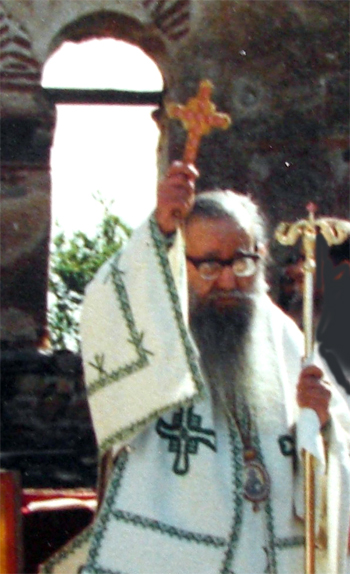 The name of bishop of Florina father Augustine Kantiotes is known to the panhellenic region and abroad for his multifarious struggles that he conducted and conducts for the purpose of restoring society and the glory of the Church. For more than a century he is struggling in various directions, without however retreating, with leader the Lord Jesus Christ, with prototype the fathers of the Church and with firm canon the God-inspired canon of Holy Scripture.
The name of bishop of Florina father Augustine Kantiotes is known to the panhellenic region and abroad for his multifarious struggles that he conducted and conducts for the purpose of restoring society and the glory of the Church. For more than a century he is struggling in various directions, without however retreating, with leader the Lord Jesus Christ, with prototype the fathers of the Church and with firm canon the God-inspired canon of Holy Scripture.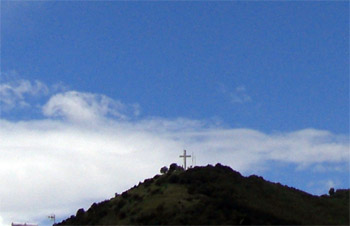 Dear friends, our Lord Jesus Christ Himself said: “the Son of man came not to be ministered unto, but to minister, and to give his life as a ransom for many” (Matt.20:28). That is to say, he did not come to be served as the ancient kings were served by their many subjects, but unlike the great and powerful people of this world, He came to become a servant, a slave of all men. Christ, the King of kings and Lord of lords, who governs the entire material and spiritual universe, before whom angels and archangels tremble, left all His glory and appeared on earth as a man, a very poor and insignificant man. No one could ever imagine that, under this lowly image in which Christ appeared, God was hidden. Even the devil was mistaken and became captive. Like the fish that sees a lure and does not suspect that there is a fish-hook beneath it, so it was with the devil. He saw a man with flesh and bones like any other man, and he thought he could easily defeat Him as he did countless other men. But in the end he faced the tremendous power of Christ, the son of the Virgin , the Son of God as well. Hades was defeated.
Dear friends, our Lord Jesus Christ Himself said: “the Son of man came not to be ministered unto, but to minister, and to give his life as a ransom for many” (Matt.20:28). That is to say, he did not come to be served as the ancient kings were served by their many subjects, but unlike the great and powerful people of this world, He came to become a servant, a slave of all men. Christ, the King of kings and Lord of lords, who governs the entire material and spiritual universe, before whom angels and archangels tremble, left all His glory and appeared on earth as a man, a very poor and insignificant man. No one could ever imagine that, under this lowly image in which Christ appeared, God was hidden. Even the devil was mistaken and became captive. Like the fish that sees a lure and does not suspect that there is a fish-hook beneath it, so it was with the devil. He saw a man with flesh and bones like any other man, and he thought he could easily defeat Him as he did countless other men. But in the end he faced the tremendous power of Christ, the son of the Virgin , the Son of God as well. Hades was defeated.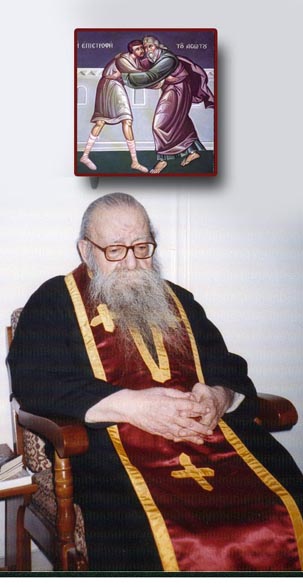 As I direct my word to you, I feel very moved. Three feelings dominate in my soul. The one is joy, the second is sorrow, and the third is worry.
As I direct my word to you, I feel very moved. Three feelings dominate in my soul. The one is joy, the second is sorrow, and the third is worry. There is no permanent place for a Priest who aspires to teaching the Gospel in the Church with a genuine spirit and who desires to become a Herald of the Truth in every direction; toward those above and those below the social pyramid.
There is no permanent place for a Priest who aspires to teaching the Gospel in the Church with a genuine spirit and who desires to become a Herald of the Truth in every direction; toward those above and those below the social pyramid.